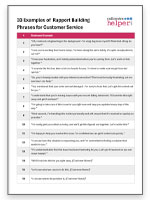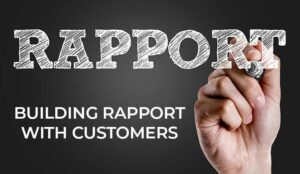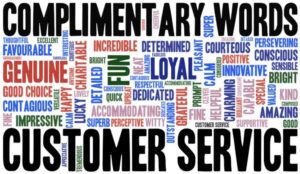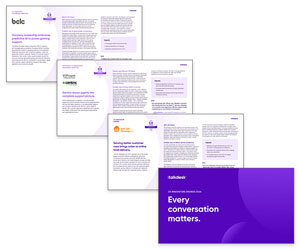Building rapport is the foundation of great customer service. Whether you’re resolving an issue, guiding a customer through a process, or simply having a friendly chat, the right words can turn an ordinary interaction into a positive and memorable experience.
Below, you’ll find 33 rapport-building phrases designed to help you create connections, show empathy, and foster trust over the phone.
33 Examples of Rapport Building Phrases
Without further ado lets jump straight in to the list of 33 phrases you can use to build rapport with customers over the phone.
- “Oh, I noticed a dog barking in the background – I’m a big dog lover myself! What kind of dog do you have?”
- “I see you’re working from home today. I’ve been doing the same lately; it’s quite an adjustment, isn’t it?”
- “I hear your frustration, and I totally understand where you’re coming from. Let’s work on this together.”
- “It sounds like this has been a bit of a hassle for you. I’m here to make sure we get it sorted quickly.”
- “So, you’re having trouble with your internet connection? That must be really frustrating. Let me see how I can help.”
- “You mentioned that your order arrived damaged – I’m sorry to hear that. Let’s get this sorted out for you.”
- “I understand that you’re having issues with your recent billing statement. I’ll look into this right away and get it resolved.”
- “I’m going to take care of this issue for you right now and keep you updated every step of the way.”
- “Rest assured, I’m handling this matter personally and will ensure that it’s resolved as quickly as possible.”
- “I’m really glad you called us today, and we’ll get this figured out together. Let’s tackle this!”
- “I’m happy to help you resolve this issue. I’m confident we can get it sorted out quickly.”
- “I can see how this situation is impacting you, and I’m committed to finding a solution that works for you.”
- “It’s understandable that this issue has been frustrating for you. Let’s get it resolved so you can move forward.”
- “We’ll look into this for you right away, [Customer Name]”
- “Let’s see what we can do to fix this, [Customer Name]”
- “I can see where the problem is, [Customer Name]”
- “What I’m doing for you right now is…”
- “That’s now been done, [Customer Name]”
- “This will be fixed by the end of the weekend, [Customer Name], and I’ll keep you updated on the progress.”
- “We’ll give you a call as soon as we’ve had an update…”
- “Don’t worry. You just enjoy your (Birthday/Easter Break/Bank Holiday), [Customer Name], and we’ll be in touch shortly…”
- “I noticed you mentioned a recent holiday – how was it? It’s always nice to get a break!”
- “I see you’re calling from a new location – did you recently move or just visiting somewhere exciting?”
- “Last time we spoke, you mentioned your upcoming trip. How was it? I hope it went well!”
- “I remember you told me about your new pet. How are they settling in?”
- “You mentioned you were working on a home project. How did it turn out?”
- “To summarize, we’ve agreed on [SOLUTION]. Is there anything else I can assist you with today?”
- “Just to recap, we’ve covered [ISSUE] and our next steps are [ACTION]. Does that sound right?”
- “While I’m pulling up your account details, could you tell me more about what happened?”
- “I’m going to check on that for you right now. In the meantime, is there anything else on your mind?”
- “Is it okay if I call you [Name], or do you prefer something else?”
- “I’m [Name], and I’ll be assisting you with this issue today. Feel free to ask for me if you need anything else.”
- “Just a reminder, I’m [Name]. I’m here to help, so don’t hesitate to reach out if you need further assistance.”
Printable – 33 Rapport Building Phrases for Customer Service with Example Statements
Do you want to download this to share with your team?
Get your free download of 33 Rapport Building Phrases for Customer Service with Example Statements now:
How To Build Rapport with Customers on the Phone
If you do use the rapport building phrases above, it is important you know when, why, and how to use them.
So lets take a look at what you can do, during a typical customer service call, to build rapport, whilst giving pointers to what kind of language, and which statements you should be using.
Demonstrate Commonality
The definition of rapport is a feeling of commonality; people like people who are like themselves. So, if you want to build rapport, you need to demonstrate commonality.
By finding common ground, you are creating an environment of “safety” and “belongingness”, which have significance when it comes building rapport.
To find common ground, encourage advisors to listen out for signs of genuine commonality, such as if the advisor was to hear a dog bark in the background, they can try to connect through a shared interest in dogs / pets.
Examples of rapport statements that can be used to demonstrate commonality include:
- “Oh, I noticed a dog barking in the background – I’m a big dog lover myself! What kind of dog do you have?”
- “I see you’re working from home today. I’ve been doing the same lately; it’s quite an adjustment, isn’t it?”
Mirror the Customer’s Tone
To get the ball rolling, advisors should take care to mirror the customer’s tone, rate and style of speech throughout each call. This demonstrates strong listening skills, another key ingredient in the creation of rapport.
These listening skills can be accentuated through good application of verbal nods and the brief repetition of each of the caller’s main points.
This should be complemented, for best results, by an expression of empathy on the part of the agent.
Examples of phrases that can be used to express empathy include:
- “I hear your frustration, and I totally understand where you’re coming from. Let’s work on this together.”
- “It sounds like this has been a bit of a hassle for you. I’m here to make sure we get it sorted quickly.”
For more examples on how to show empathy over the phone, read our article: 18 Empathy Statements That Help Improve Customer-Agent Rapport
Repeat the Problem
By repeating the problem, advisors can show that they are engaged mentally in the process, which demonstrates that the advisor has genuine interest in the matter.
This could increase trust between advisors and the customer, consequently aiding the rapport building process.
Take, for example, a customer who has called to report the delivery of a faulty product. The advisor who repeats the situation “Your toaster is broken? That’s terrible, Mrs Brown…”, rather than proceeding immediately and emotionlessly to the resolution, will gain an invaluable affinity with the caller.
This simultaneously provides subtle assurance that the complaint is now in good hands.
For example, the agent could use the following statements:
- “So, you’re having trouble with your internet connection? That must be really frustrating. Let me see how I can help.”
- “You mentioned that your order arrived damaged – I’m sorry to hear that. Let’s get this sorted out for you.”
- “I understand that you’re having issues with your recent billing statement. I’ll look into this right away and get it resolved.”
Assert Control
It is important for the advisor to assert control of the situation, to take ownership of the problem, and to convince the customer that the matter in question will be put right.
This can be conveyed through the advdivor’s employment of a positive, emphatic style of speech, the adoption of an especially courteous vocabulary and the consistent use of concise-yet-energetic sentences.
If, as is likely, apologies are called for, the advisor should avoid repeating his or her regret using the same terminology. Instead, an assortment of contrite synonyms should be used, with the word “sorry” being substituted for “I apologise”, “oh dear”, and so on.
Examples of rapport phrases that can be used to assert control include:
- “I’m going to take care of this issue for you right now and keep you updated every step of the way.”
- “Rest assured, I’m handling this matter personally and will ensure that it’s resolved as quickly as possible.”
Change Your Mindset
To help advisors build an emphatic speech style, as mentioned above, it is important to help them avoid a negative mindset, which can damage the rapport building process.
By removing negative thoughts and smiling, advisors can convey the message that they are a friendly person to talk to. This creates a feeling of safety, which is an important part of rapport building, according to Maslow’s ‘Hierarchy of Needs’.
By encouraging advisors to smile, it can elevate the tone of their voice, meaning that they sound more friendly and warm. So, whilst the customer cannot see it, they are able to hear it.
The agent could use the following statements when talking to the customer:
- “I’m really glad you called us today, and we’ll get this figured out together. Let’s tackle this!”
- “I’m happy to help you resolve this issue. I’m confident we can get it sorted out quickly.”
So, to encourage this and to remove any negative thoughts, encourage advisors to change their mindset, just like in the examples that are part of the table below.
| Instead of Thinking… | Encourage Advisors to Think… |
|---|---|
| “I don’t feel like smiling” | “Smiling will start the rapport process and help me to serve the customer better and faster” |
| “It’s nearly time to go home and this call has come through” | “Smiling will start the rapport process and help me to serve the customer better and faster, then I’ll be able to go home” |
| “This customer sounds like the difficult one I had last week” | “Maybe they do but what other evidence do I have that they are going to be like that customer – none, so I’ll focus on them as an individual” |
Be Empathetic, Not Sympathetic

Two basics that advisors are taught in training is that customers want you to resolve their issue and they want you to acknowledge how they are feeling.
Customers might take a couple of minutes to state what their problem is and they might share with advisors how they are feeling about it and the consequences it has had on them.
Once they have done so, the advisor has two options:
Be Sympathetic – To immerse their selves in the customer’s problems and use statements such as “I understand” or “that must be awful”.
Be Empathetic – To clarify what they have heard and then acknowledge that the situation has had distressing consequences. Finally, the advisor would fully commit to addressing the problem and solving it.
By following the three basic stages of empathy, as shown above, you can better your chances of building rapport as you are focusing on a solution, rather than dwelling on a problem.
However, you have also clarified and acknowledged the problem at hand, furthering trust and mutual understanding.
Examples of phrases that can be used include:
- “I can see how this situation is impacting you, and I’m committed to finding a solution that works for you.”
- “It’s understandable that this issue has been frustrating for you. Let’s get it resolved so you can move forward.”
Contributed by: Christine Knott, Managing Director at Beyond the Box
Provide a Sense of Immediacy
Customer frustration often stems from the amount of effort it takes for an advisor to resolve their query, but you can cut this frustration and build rapport by providing a sense of immediacy.
If the customer can sense that you are acting to minimise their “wait time” and decrease the amount of effort that they have to exert, it can only add positivity to the call.
There are a few ways to provide a sense of immediacy, but important points to remember are:
- Display a recognition of the urgency of the matter
- Using the collective “we” suggests partnership, and implores reciprocal cooperation
- Demonstrate the agent’s experience in such matters, and hint at their ability to provide a solution
- Assert control and hint towards spontaneous, possibly discretionary action
- Provide a pay-off and showing that the caller’s trust had not been placed in vain.
By providing a sense of immediacy, like in the example statements below, you can build rapport:
- “We’ll look into this for you right away, [Customer Name]”
- “Let’s see what we can do to fix this, [Customer Name]”
- “I can see where the problem is, [Customer Name]”
- “What I’m doing for you right now is…”
- “That’s now been done, [Customer Name]”
Provide Reassurance
In a situation where the call has ended without a resolution, it is necessary to provide reassurance to the customer that his or her complaint will be seen through to its conclusion.
This can be done by utilising a number of heartening, yet slightly informal, phrases, that should include at least one of the following:
- Setting a definite timeframe for the resolution
- Promising contact – and following through with this commitment – will help form a basis for long-term trust.
- Recognising and commenting on the customer’s personal circumstances will lend the call closure a more pleasant, personal touch.
Phrases to provide reassurance could include:
- “This will be fixed by the end of the weekend, [Customer Name], and I’ll keep you updated on the progress.”
- “We’ll give you a call as soon as we’ve had an update…”
- “Don’t worry. You just enjoy your (Birthday/Easter Break/Bank Holiday), [Customer Name], and we’ll be in touch shortly…”
Providing reassurance is also important when dealing with angry customers. For more on this subject, read our article: The Right Words and Phrases to Say to an Angry Customer
Notice the Small Things
Pick up on the small things… a dog in the background, are they at work, did you notice it was their birthday when you took the details?
These small things build ‘real’ rapport rather than throw away comments or tricks to ‘manufacture’ rapport.
For example, the agent could use the following phrases:
- “I noticed you mentioned a recent holiday – how was it? It’s always nice to get a break!”
- “I see you’re calling from a new location – did you recently move or just visiting somewhere exciting?”
Contributed by: Charlie
Make Notes of Personal Things
As we speak to a customer a few times before they visit us, my team take notes of little personal thing ready for the next call e.g. the dog, holiday etc. ready for the next person calling them.
These notes would have most likely of been stored in the contact centre’s CRM system, to provide easy access for the next advisor.
For example, the agent could use the following statements:
- “Last time we spoke, you mentioned your upcoming trip. How was it? I hope it went well!”
- “I remember you told me about your new pet. How are they settling in?”
- “You mentioned you were working on a home project. How did it turn out?”
If you want to find out more on CRM, read our article: An Introduction to… Customer Relationship Management (CRM) Systems
Contributed by: Jemma
End of Call Recap
Recap what you went over with the customer at the end of the call that so that they feel part of the solution.
People tend to recall the last thing that was said to them, so this reinforces the positive steps taken.
Examples of statements that an agent could use to recap the call include:
- “To summarize, we’ve agreed on [SOLUTION]. Is there anything else I can assist you with today?”
- “Just to recap, we’ve covered [ISSUE] and our next steps are [ACTION]. Does that sound right?”
Contributed by: Bill
Minimise Dead Air Time
Involve the customer in what you are doing. Avoid/minimize dead air in the call.
Dead air time is where neither the advisor or the caller is talking. This is often as a result of putting information into the computer system.
Examples of phrases that can be used to minimise dead air time, include:
- “While I’m pulling up your account details, could you tell me more about what happened?”
- “I’m going to check on that for you right now. In the meantime, is there anything else on your mind?”
Contributed by: Joel
Identify a Customer’s Preferred Name
Ask the customer if it is OK to call them by their first name. If yes, this will allow the rapport to build and you will know the overall feeling of the customer as well as understanding what their communication style is.
Alternatively, it could be recommended that you ask the customer how they would like to be addressed, which can work to the same effect.
An example phrase an agent could use to get the customer’s preferred name is:
- “Is it okay if I call you [Name], or do you prefer something else?”
If you’re unsure whether you should call a customer by their name, read our article: Should We Call Customers by Name?
Contributed by: Bill
Ask Advisors to Repeat Their Name to the Reader
Tell your customer your name and that you will be looking after them today, remind the customer again at call close.
This reassures the customer that they are getting personal treatment, and allows them to ask for the same advisor next time.
For example, the agent could use the following phrases:
- “I’m [Name], and I’ll be assisting you with this issue today. Feel free to ask for me if you need anything else.”
- “Just a reminder, I’m [Name]. I’m here to help, so don’t hesitate to reach out if you need further assistance.”
If you want more insights on whether or not call and contact centre agents should give their full name to customers, read our article: Do I Have to Give My Full Name to a Customer?
Contributed by: Helen
Prove how the Customer Can Gauge Mood / Tone Over the Phone
In our training, we prove that people get an impression of you on the phone within seconds.
We turn around and say the same greeting (words) in 5 various ways, yawning to show tiredness, professional, angry and growling, flirty (which gets a lot of laughs), and shy and timid.
When we turn around we ask for feedback and they guess each time the impression we have given them which demonstrates that we have said the exact same thing yet they made a quick impression.
Contributed by: Terri
Our readers made a few points you also need to consider when using these rapport building statements, and building rapport in general:
- It’s not enough to read these phrases, you should say it with feelings. Intonation. Be perky! Remember: It is not about what you say , it’s how you say it!
- Owning a situation as your own and never deflecting to a system, policy or another person is a key point in resolving a issue that has escalated.
- Building rapport is all about building connection. Just talk to your customers. For example you can make a great start in building rapport by simply asking:
- “How can I make your day better”?
- “Have I handled all of your questions and concerns?”
- “How was your day been?”
- “What are your plans for the coming weekend?”
For more on building rapport in the contact centre, read these articles next:
- How to Build Rapport on the Phone
- What Are the Best Words and Phrases for Building Rapport?
- 27 Effective Ways to Build Customer Rapport
Author: Jonty Pearce
Reviewed by: Hannah Swankie
Published On: 17th Oct 2012 - Last modified: 6th Mar 2025
Read more about - Skills, Christine Knott, Customer Satisfaction (CSAT), CX, Downloads, Empathy, Language, Positive words, Printable, Rapport






















